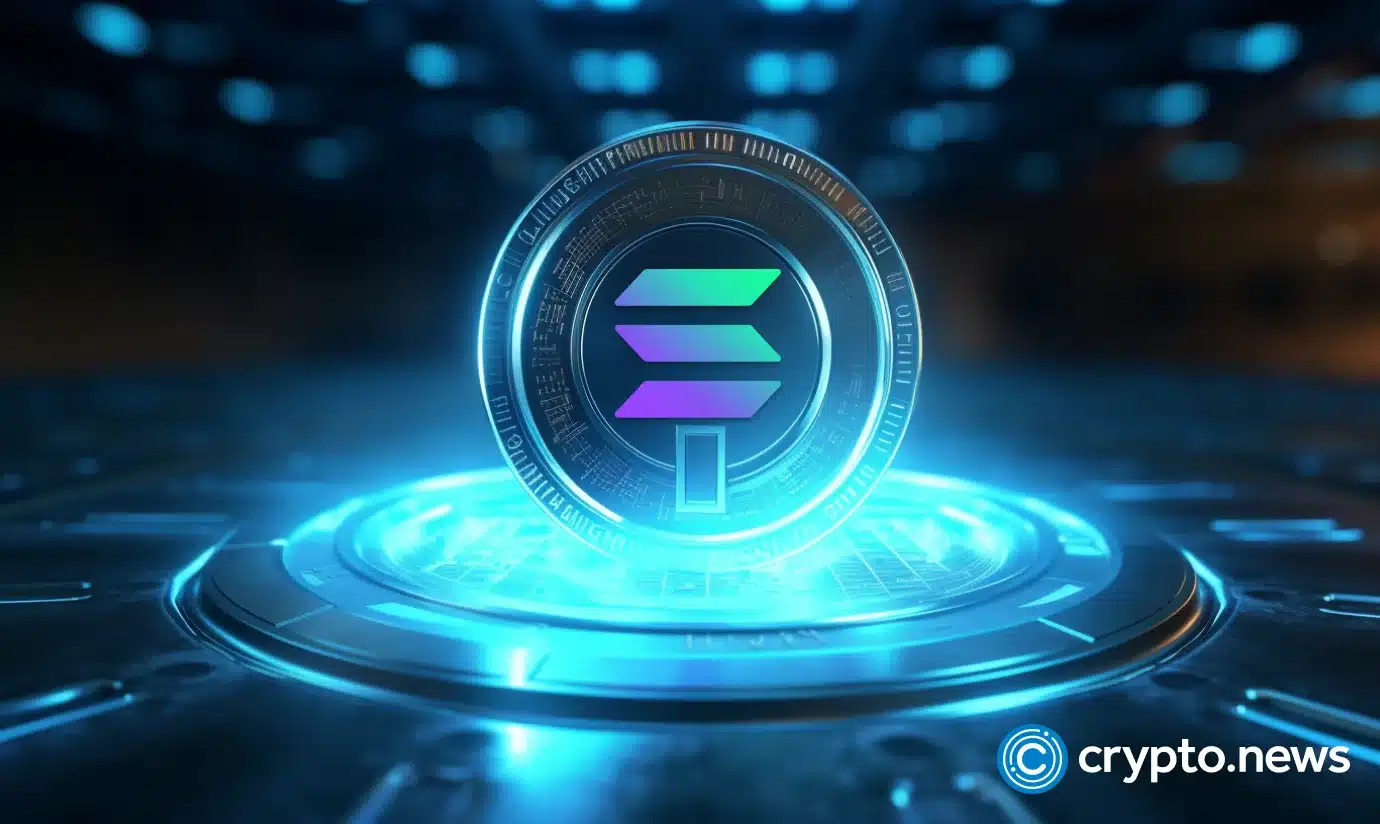Solana (SOL) price loses $90 support amid altcoin market downturn, what next?

Solana (SOL) price slid to a 30-day low of $82 on Jan. 22 as crypto investors scaled back on mega-cap altcoin acquisitions, here’s what could happen next.
Solana emerged one of the best performing mega cap altcoins, as the crypto market rallied in the build up to the spot Bitcoin ETF verdict. But, since SOL hit a 2-year peak of $126.1 on Dec. 25, the price has headed south.
On-chain data trends unveil key factors driving the current Solana decline and what price action to anticipate in the week ahead.
Volatile macro conditions behind Solana price downtrend
Since the turn of the year, Solana network has maintained strong performance in its underlying growth metrics, with network usage and daily active users on a steady rise. However, Solana price fell to $82 on Jan. 22, bringing its weekly time frame losses to the 20% mark.
The Solana price decline has been attributed to bearish sentiment surrounding the broader altcoin markets. TradingView’s TOTAL3 chart sums up the market capitalization of all listed crypto assets excluding Bitcoin (BTC) and Ethereum (ETH).
As depicted below while SOL price has dropped 20% between Jan 14 and Jan 22, the TOTAL3 chart also shows an 8% downtrend. The TOTAL.3 chart (total crypto market cap excluding BTC & ETH) shows that the global altcoin market has shrunk by $32 billion over the past week. This signals that investor confidence in the sector as a whole has been on a downtrend. As the 8th largest cryptocurrency, it’s not surprising that SOL price has been disproportionately impacted.
Without a significant improvement in market sentiment, SOL could experience more downside.
Investors are bracing up for more downside
In the derivatives market, Solana investors appear to be closing out their positions in anticipation of further price downswings. Santiment’s open interest data tracks the real-time value of all active derivatives contracts for a particular cryptocurrency. According to the chart below, SOL open interest is down $226 million since Jan. 17. Solana (SOL) Open Interest vs. Price Source: Santiment
A closer look at the chart shows that Solana open interest slid $1.3 billion on Jan 17 to $1.06 billion at press time on Jan 22, representing a 20% price decline.
A decline in open interest means that more investors are exiting their positions than those bringing in new capital. This further affirms the growing disinterest among crypto investors.
In summary, volatility in the altcoin markets and negative trading activity among derivatives speculators are two major factors behind the ongoing Solana price downtrend.
Solana (SOL) price forecast: Bears could target $75
Drawing insights from the derivatives and market data trends analyzed above, SOL price is likely to experience more downside toward the $75 area the coming days.
The Bollinger bands technical indicators also emphasize this bearish outlook. It shows that, with SOL price currently trading as $82, it has now wobbled below the 20-day Simple Moving Average price of $93.
Concisely put, this means that investors are willing to pay less for Solana price than they were 20 days ago.
However, the bulls could regroup around the lower-Bollinger band at $85, in attempts to trigger an early rebound. But if the bears can scale that buy-wall SOL price could slide towards $75, as predicted. Solana (SOL) Price Forecast | TradingView
On the upside, the bulls could regain control if they successfully force an upswing above $95. However, as highlighted above, the 20-day SMA at $95, could pose a major resistance, as investors holding unrealized losses over the last 20-days could begin to exit once price approach their break-even point.
Avalanche and Tezos holders exploring Kelexo, momentum rising
January 23, 2024 at 8:12 am
SPONSORED PARTNER CONTENT
PARTNER CONTENT
Disclosure: This article does not represent investment advice. The content and materials featured on this page are for educational purposes only.
Several blockchain solutions in the market offer different benefits. Avalanche (AVAX) and Tezos (XTZ) are some available options. They are designed to address scalability and other challenges that chains like Ethereum (ETH) face. Amid this, Kelexo (KLXO) is conducting a presale for its peer-to-peer lending network.
Avalanche is eco-friendly
Avalanche addresses security, scalability, and decentralization challenges.
According to its developers, Avalanche has achieved all three while being eco-friendly and energy-efficient.
Its unique features and green credentials have contributed to its popularity, with its value increasing significantly last year and TVL on defi markets reaching $810 million.
Tezos losing steam
Tezos has been under pressure after peaking in 2021.
Tezos addressed its slow network speed with an upgrade called “Nairobi,” announced mid-last year.
You might also like: Paris museum to mint Van Gogh’s NFTs on Tezos
This upgrade has been viewed as a positive development for Tezos and may help the token regain momentum.
Additionally, given the growth of the defi market, there may still be opportunities for Tezos to thrive.
Kelexo presale ongoing
The defi sector has expanded to over $57 billion, though it remains in early developmental stages with hurdles like centralization risks.
Kelexo aims to enable peer-to-peer lending in a secure and decentralized manner.
With over 1.5 billion unbanked individuals lacking access to financial services, Kelexo attempts to unlock new avenues for participation.
You might also like: Dogecoin and Solana holders looking at Kelexo presale
On the Kelexo network, borrowers and lenders can connect directly to agree on customized terms without intermediaries. Proponents argue this structure could promote financial accessibility and sustainability.
Potential benefits touted include lower interest rates for borrowers relative to some defi rivals while lenders preserve flexibility in asset commitment durations.
By re-conceptualizing decentralized lending, Kelexo tries to propel defi advancement through an architecture aligning individual user incentives.
Conclusion
Avalanche is growing amid a general growth in the defi market. Meanwhile, Tezos is losing steam. In the first phase of presale, KLXO is available for $0.022.
Read more: Polkadot and Chainlink bullish, analysts back Kelexo for growth
Disclosure: This content is provided by a third party. crypto.news does not endorse any product mentioned on this page. Users must do their own research before taking any actions related to the company.
Meta faces pressure from Congresswoman Maxine Waters over crypto trademark filings
NEWS
Congresswoman Maxine Waters raised concerns over Meta’s recent trademark filings related to crypto, seeking clarification on the company’s plans in web3.
Rep. Maxine Waters (D-Calif.) sent a letter to Meta executives, seeking answers about Meta’s apparent intention to expand its involvement in the crypto ecosystem.
Waters, who serves as the top Democrat on the House Financial Services Committee, conveyed her concerns through a letter addressed to Meta’s top executives, including CEO Mark Zuckerberg and COO Javier Olivan. The letter delves into inquiries about Meta’s strategic direction in web3 and explores its stance on stablecoin initiatives following Meta’s submission of five trademark applications related to crypto and blockchain products with the U.S. Patent and Trademark Office.
“With its initial filings on Mar. 18, 2022, Meta’s application submissions as of Jan. 22 appear to represent a continued intention to expand the company’s involvement in the digital assets ecosystem.”
Rep. Maxine Waters
As of press time, Meta has not issued any public statements on the matter. The company’s current involvement, if any, in crypto-related projects also remains uncertain. However, Waters seeks clarification on these matters, emphasizing Meta staff’s statement to U.S. authorities in October 2023, where they asserted that there was no ongoing crypto-related work at Meta.
“Additionally, Meta staff asserted that Meta is not working with any partners on integrating stablecoins or cryptocurrency into any payments or Metaverse products, and is not pursuing research and development in the space.”
Rep. Maxine Waters
You might also like: Meta suspends NFT feature on Facebook and Instagram
Waters addressed lingering concerns about Meta’s plans regarding crypto, saying the House Financial Services Committee previously expressed its concerns regarding Facebook‘s potential creation of a cryptocurrency.
Facebook first announced its plans to develop a cryptocurrency called Libra as well as a digital wallet dubbed Calibra in June 2019. In response to that initiative, Waters noted that Facebook “has data on billions of people and has repeatedly shown a disregard for the protection and careful use of this data,” adding that “regulators should see this as a wake-up call to get serious about the privacy and national security concerns […].”
However, the Libra project, later rebranded as Diem, was shut down in 2022 by the Diem Association following congressional hearings, regulatory scrutiny, and departures of key members. The Diem Association later sold its assets for approximately $200 million to the now-defunct lender Silvergate Bank, citing challenges in moving forward due to feedback from federal regulators.
Coinbase, Consensys, others critique US Treasury’s proposed bulk reporting for mixer transactions
NEWS
Collect the article
share
Coinbase, Consensys, and Paradigm are urging the U.S. Treasury to reconsider its proposed reporting requirements for crypto mixer transactions, citing a lack of specificity and concerns over resource allocation.
In a comment to the Treasury Department’s Financial Crimes Enforcement Network (FinCEN) on Jan. 22, Coinbase stated that regulated platforms already comply with existing rules for recordkeeping and reporting of suspicious activities and illicit crypto mixing.
The firm is particularly critical of the proposal’s requirement for crypto platforms to report all crypto mixing activities, including those serving legitimate purposes. Coinbase contends that this broad approach would lead to inefficient use of resources and unnecessary bulk reporting of non-suspicious transactions.
Paul Grewal, chief legal officer of Coinbase, shared his thoughts in a Jan. 22 thread on X, emphasizing the need for more targeted measures. He believes a data dump without a monetary threshold is counterproductive and a waste of time and resources.
We filed comments today on @USTreasury’s proposed rule on crypto mixing. @coinbase supports effective regulations, but not bulk data collection and reporting requirements for all transactions involving any crypto mixing–even with no indication of suspicious activity. 1/6
— paulgrewal.eth (@iampaulgrewal) January 22, 2024
“This is not simply a misuse of VASPs’ [virtual asset service providers] finite compliance resources; it is exactly the kind of bulk reporting that Congress has explicitly discouraged.”
Coinbase
Grewal suggests that FinCEN should instead offer specific guidance to help exchanges meet their existing obligations to report suspicious activity involving mixing.
You might also like: Unveiling the shadows: FinCEN’s crackdown on crypto mixers
FinCEN’s proposed rulemaking, announced last October, aims to increase transparency around crypto mixing activities. While recognizing the legitimate and innovative uses of crypto mixing, FinCEN expressed concerns over its potential for money laundering by illicit actors, including North Korean hackers and Russia-based ransomware attackers.
To mitigate these concerns, Coinbase proposed introducing a threshold to eliminate the reporting of minor transactions and recommended focusing on recordkeeping over reporting to reduce privacy and security risks.
Under the proposed rules, the mixing of convertible virtual currencies would be classified as a “primary money laundering concern.” The classification affects not just dedicated tumblers like Tornado Cash but also service providers using basic privacy protocols. Financial institutions would be required to maintain records and reports related to transactions involving digital asset tumblers, imposing KYC, AML, and CFT requirements on operators of these services.
FinCEN’s rulemaking is based on Section 311 of the USA Patriot Act, which authorizes the Treasury Secretary to identify and take special measures against entities seen as “primary money laundering concerns.”
In addition to Coinbase, Consensys, an Ethereum software solutions firm, has also expressed concerns about the reporting requirements. In a letter dated Jan. 22, they addressed FinCEN, suggesting the need for a security solution that effectively balances the preservation of privacy.
“If this has to happen, then please make it narrow enough not to do real damage to the ecosystem and its users,” it stated.
Today, @Consensys submitted a letter to FinCEN concerning its proposal to have regulated financial intermediaries surveil and report activity relating to crypto token mixers. TLDR: if this has to happen, then please make it narrow enough not to do real damage to the ecosystem… pic.twitter.com/0ESJyRQJaG
— Bill Hughes : wchughes.eth 🦊 (@BillHughesDC) January 23, 2024
Similarly, the Blockchain Association responded to FinCEN, critiquing the overly broad definition of ‘CVC mixing’ in the proposal. It argued that the proposal lacked sufficient evidence to justify such an expansive interpretation.
Today, @BlockchainAssn submitted comments to @FinCEN’s proposed convertible virtual currency mixing rule. The Proposal ignores legitimate uses of #mixers & would apply overly-broad requirements on users, driving #digitalassets to less regulated markets.
📎https://t.co/CyrkGOzhHf…
— Dan Spuller (@DanSpuller) January 22, 2024
Paradigm, a venture capital firm focused on crypto, also filed a response. It expressed its opinion that the proposed rule fails to adequately address FinCEN’s concerns. Coin Center, another key player in the space, described the rulemaking as both unprecedented and excessively broad.
On a related note, Coinbase’s Chief Legal Officer, Paul Grewal, publicly expressed his criticism of a recent crypto report by the US Government Accountability Office (GAO) on Jan. 22. Grewal accused the report of being sensationalistic, emphasizing the lack of comparative and analytical depth in its approach. He questioned the rationale behind the GAO’s criticism of the crypto industry, especially considering the industry’s substantial investments in legal compliance.
The GAO report, spanning 63 pages, highlighted concerns about digital assets being potentially used to circumvent economic sanctions. It specifically noted that assets like Bitcoin could be utilized by sanctioned entities to obscure their transactions. This report has added another layer to the ongoing debate around the role and regulation of cryptocurrencies in the global financial system.
Cardano and Dogecoin investors bullish on Pushd in ongoing presale
 PARTNER CONTENT
PARTNER CONTENT
Disclosure: This article does not represent investment advice. The content and materials featured on this page are for educational purposes only.
The crypto market is a dynamic and ever-changing landscape, offering diverse investment options with varying characteristics and potential for growth. Investors’ perspectives on crypto investments vary, with some anticipating Cardano (ADA) surpassing $1 by 2024 and others intrigued by Dogecoin’s (DOGE) recent price surge. Additionally, emerging projects like Pushd (PUSHD) aim to redefine decentralized marketplaces.
Cardano is on a bullish path
Cardano rallied in 2023, reaching $0.60 on New Year’s Eve.
Analysts predict that ADA has the potential to surpass $1 in 2024, citing various factors that could contribute to this growth.
You might also like: Cardano utilizes Polkadot tech stack for partner chains
Guy Turner and Dan Gambardello, prominent analysts in the crypto space, point to collaborations and price trajectories as catalysts for ADA’s upward momentum.
Dogecoin rising
Dogecoin rose by over 14% within 12 hours, coinciding with the official launch of Elon Musk’s financial venture, Xpayments.
This development has sparked speculation about a potential integration of Dogecoin into Xpayments’ payment processing services.
You might also like: Elon Musk’s X seemingly opens dedicated payments page
While Musk has not explicitly confirmed any plans for token issuance or Dogecoin integration, the market’s reaction to Xpayments’ social media updates has fueled anticipation of a significant partnership.
Pushd aims to redefine decentralized marketplaces
Pushd, a new decentralized marketplace, is gaining attention for its focus on user satisfaction, low fees, fast transactions, and a rewards program.
In the ongoing presale, PUSHD is available for $0.075.
You might also like: Monero, Cardano, and Solana investors tracking Pushd in presale
The project’s developers emphasize their commitment to transparency and efficiency, aiming to change how decentralized marketplaces operate.
The project has a total supply of 250,000,000 PUSHD.
Token holders will earn a share of platform fees. At the same time, the project’s security measures provide a sense of confidence for investors.
Read more: USDT and USDC holders exploring Pushd presale
Disclosure: This content is provided by a third party. crypto.news does not endorse any product mentioned on this page. Users must do their own research before taking any actions related to the company.

















































